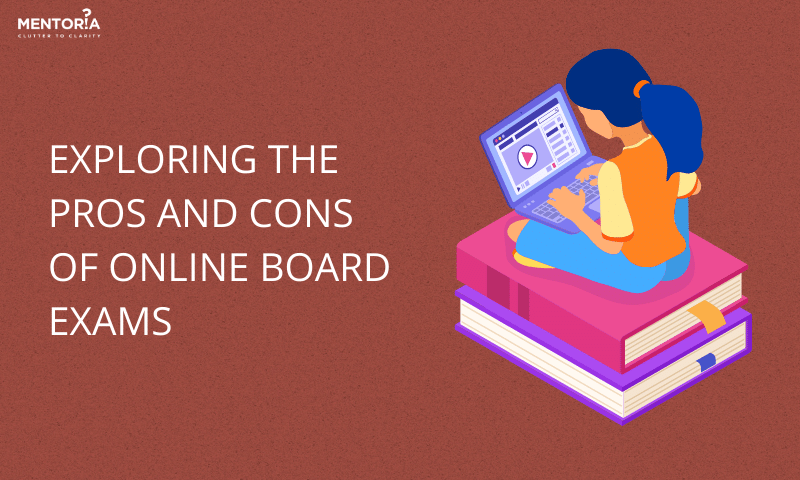Exploring The Pros And Cons Of Online Board Exams

In the ever-evolving landscape of education, the emergence of online board exams is nothing short of revolutionary. While the traditional pen-and-paper format has been the cornerstone of our educational system for decades, technological advancements have paved the way for a more modern approach to assessment. But are online board exams truly the enhanced alternative they promise to be? In this blog, we’ll dive into the world of online board exams, exploring their benefits, drawbacks, and the impact they could have on students and the education system as a whole.
The Benefits Of Online Board Exams
Accessibility And Convenience
Online board exams eliminate the need for students to travel to physical exam centres, offering an unprecedented level of accessibility and convenience. In a world where time and resources are valuable commodities, this benefit cannot be overstated. Students can take their exams from the comfort of their homes, reducing travel-related stress and expenses. Additionally, this convenience extends to individuals with disabilities or health issues, who may find it challenging to participate in traditional exams. Online exams level the playing field, ensuring that everyone has an equal opportunity to showcase their knowledge and skills.
Enhanced Security
Online board exams have ushered in a new era of security in assessment. With biometric authentication, advanced monitoring software, and secure online proctoring, the integrity of the exam process is significantly fortified. Traditional exams often face security challenges, such as question paper leaks or impersonation, but online assessments mitigate these risks. Real-time monitoring and the ability to detect suspicious behaviour immediately ensure a fair and secure testing environment. These measures not only protect the authenticity of the exam but also enhance the confidence of students and institutions in the assessment process.
Instant Feedback
The ability to receive instant feedback is a game-changer in education. Online board exams provide this advantage, allowing students to access their results immediately after completing the assessment. This real-time feedback empowers students to identify their strengths and weaknesses swiftly, which is instrumental in guiding their study strategies. It fosters a proactive approach to learning, enabling students to focus on areas where improvement is needed. Moreover, educators can also benefit from instant data analysis, gaining insights into areas where students may be struggling, thus enabling timely interventions and personalised support.
Reduced Paper Usage
Online board exams contribute to environmental sustainability by drastically reducing paper consumption. Traditional exams generate enormous amounts of paper waste, a concern in an era increasingly focused on eco-consciousness. The shift to digital assessments aligned with global efforts to reduce environmental impact and promote sustainability. It not only conserves precious natural resources but also reduces the carbon footprint associated with paper production and disposal. In an age where environmental responsibility is a shared concern, this benefit resonates with students, educators, and institutions alike, making online board exams a responsible choice for assessment.
Flexibility In Question Formats
Online board exams offer the flexibility to employ a diverse range of question formats. Traditional exams typically rely on multiple-choice questions or short-answer formats, limiting the scope for assessing a student’s understanding comprehensively. In contrast, online assessments can incorporate various question types, including multiple-choice, short answer, essay questions, and even multimedia elements like videos and simulations. This variety allows educators to design assessments that align with specific learning objectives and better evaluate students’ critical thinking and problem-solving abilities. It fosters a more well-rounded and dynamic assessment experience that caters to diverse learning styles and promotes deeper learning.
The Challenges Of Online Board Exams
While online board exams offer numerous advantages, they also present certain challenges:
Technical Glitches
Online board exams heavily rely on technology, which can sometimes be prone to glitches and disruptions. Internet connectivity issues, server crashes, or software malfunctions can create considerable stress for students. In the midst of an exam, encountering such problems can not only disrupt their focus but also raise concerns about fairness and assessment accuracy. These technical hiccups can lead to valuable exam time being wasted in troubleshooting, potentially affecting a student’s performance and confidence. Thus, ensuring a robust and reliable technological infrastructure is imperative to mitigate this challenge.
Cheating Concerns
Maintaining the integrity of online exams presents an ongoing challenge. Despite stringent security measures, some students may still find ways to cheat. They can use external devices or enlist the help of others, compromising the fairness of the assessment. Detecting and preventing cheating in the virtual space is a constant battle, requiring sophisticated anti-cheating software and vigilant proctoring. Striking a balance between stringent security and student privacy is essential, as overly intrusive measures can raise ethical concerns. Addressing these cheating concerns remains a critical challenge for online board exams.
Lack Of A Controlled Environment
Unlike traditional exams held in controlled environments, online board exams cannot guarantee the same level of control. Students have greater access to external resources, which can make it challenging to assess their true understanding of the subject matter. This lack of control can also raise questions about the authenticity of students’ work, especially when it comes to projects, essays, or take-home assignments. Balancing flexibility with maintaining the academic integrity of the assessment is an ongoing challenge for educators and institutions offering online board exams.
Digital Divide
A significant challenge associated with online board exams is the digital divide. Not all students have equal access to the necessary technology and a stable internet connection. This inequality can exacerbate educational disparities, putting disadvantaged students at a disadvantage. Addressing this issue requires a commitment to bridging the digital divide through initiatives that provide access to technology and internet connectivity to all students. Failure to do so can result in unequal educational opportunities and hinder the adoption of online board exams on a broader scale.
A Balancing Act: The Hybrid Approach
To address these challenges, many educational institutions are adopting a hybrid approach. This approach combines elements of both traditional and online board exams to strike a balance. Here’s how it works:
- Students take some exams online, benefiting from the convenience and instant feedback.
- Other assessments remain traditional, preserving the controlled environment and minimising cheating concerns.
The Impact On Students
- Stress Reduction: Online exams often reduce the stress associated with traditional exams. Students feel more comfortable taking assessments in familiar surroundings, which can improve their performance.
- Adaptability Skills: Students exposed to online exams develop essential adaptability skills. They become tech-savvy and comfortable with digital tools, valuable competencies in today’s job market.
- Self-discipline: Online exams require students to be more self-disciplined and responsible for their own success. This skill can be beneficial in various aspects of life.
- Reduced Time Pressure: Instant feedback from online exams allows students to better manage their time and focus on areas where they need improvement. This can lead to better overall time management skills.
The Educator’s Perspective
Educators play a pivotal role in shaping the transition to online board exams. Here’s how they view the change:
Improved Assessment Tools
Online exams provide educators with a wider range of assessment tools. They can design more interactive and engaging assessments that accurately measure a student’s understanding.
Streamlined Evaluation
Grading and evaluation become more efficient with online exams, freeing up educators’ time to focus on teaching and mentoring.
Enhanced Data Insights
Online exam platforms generate valuable data on student performance. Educators can use this data to identify trends, adapt teaching methods, and provide personalised support to struggling students.
The Future Of Online Board Exams
The rise of online board exams isn’t a mere trend; it’s a fundamental shift in the education landscape. As technology continues to advance, we can expect even more innovative changes in the way students are assessed. Here are some potential developments:
- Increased integration of artificial intelligence to personalise exams based on each student’s learning level and style.
- Gamification elements in online assessments to make learning and exams more engaging.
- The possibility of remote proctoring becoming more sophisticated, ensuring the integrity of online exams.
Mentoria: Your Educational Partner
At Mentoria, we’re committed to supporting students in their educational journeys, whether it’s acing board exams or charting a path to their dream careers. Our experienced team of mentors and educators understands the unique challenges that students face. We offer personalised guidance, study resources, and strategies to help you excel in your studies and beyond.
With Mentoria by your side, you can confidently embrace the future of education and make the most of opportunities like online board exams. Together, we’ll unlock your full potential and pave the way for a brighter academic and professional future.









